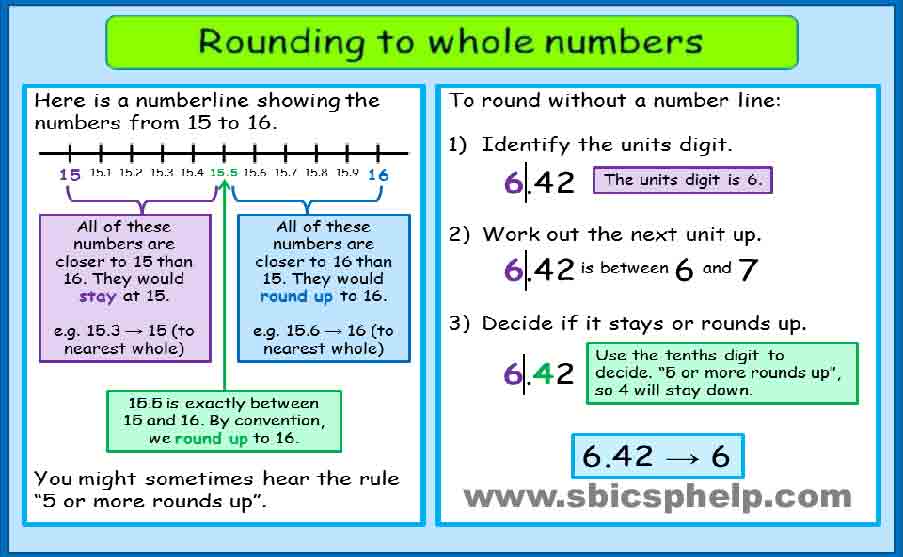- Properties of Whole Numbers :Additive Properties (Properties due to Addition):
a) Closure Property of Addition: The Set of Whole Numbers is closed with respect to the operation of Addition. In general, it means that the sum of Whole Numbers is always a Whole Number.
This is known as Closure Property of Addition in the Set of Whole Numbers.
For example: 3 and 5 are two Whole Numbers, then 3 + 5 = 8 is also a Whole Number.
- b) Commutative Law of Addition: If a and b are two Whole Numbers, then
a + b = b + a.
This is known as Commutative Law of Addition in the Set of Whole Numbers.
For example: 3 and 5 are two Whole Numbers, then
3 + 5 = 8
&
5 + 3 = 8
Hence, it is established that, 3 + 5 = 5 + 3
- c) Associative Law of Addition: If a, b and c are three Whole Numbers, then
a + (b + c) = (a + b) + c
This is known as Associative Law of Addition in the Set of Whole Numbers.
For example: 3, 5 and 7 are three Whole Numbers then
3 + (5 + 7) = 3 + 12
= 15
&
(3 + 5) + 7 = 8 + 7
= 15
Hence, it is established that, 3 + (5 + 7) = (3 + 5) + 7
- d) Existence of Additive Identity: For every Whole Number a, there exist a unique Whole Number 0 (Zero) such that
0 + a = a + 0 = a
0 (Zero) iscalled the Additive Identity in the Set of
Whole Numbers For example: Let us consider a Whole Number 5. Then we have,
0 + 5 = 5 + 0 = 5
- Multiplicative Properties (Properties due to Multiplications):
- a) Closure Property of Multiplication: The Set of Whole Numbers is closed with respect to the operation of Multiplication. In general, it means that the Product of Whole Numbers is always a Whole Number.
This is known as Closure Property of Multiplication in the Set of Whole Numbers.
For example: 3 and 5 are two Whole Numbers, and then 3 × 5 = 15 is also a Whole Number.
Also Read Properties of Natural Numbers
- b) Commutative Law of Multiplication: If a and b are two Whole Numbers, then
a × b = b × a.
This is known as Commutative Law of Multiplication in the Set of Whole Numbers.
For example: 3 and 5 are two Whole Numbers, then
3 × 5 = 15
&
5 × 3 = 15
Hence, it is established that, 3 × 5 = 5 × 3
- c) Associative Law of Multiplication: If a, b and c are three Whole Numbers, then
a × (b × c) = (a × b) × c
This is known as Associative Law of Multiplication in the Set of Whole Numbers.
For example: 3, 5 and 7 are three Whole Numbers then
3 × (5 × 7) = 3 × 35
= 105
&
(3 × 5) × 7 = 15 × 7
= 105
Hence, it is established that, 3 × (5 × 7) = (3 × 5) × 7
- d) Existence of Multiplicative Identity: For every Whole Number a, there exist a unique Whole Number 1 (one) such that
a × 1 = 1 × a = a
1 (one) is called the Multiplicative Identity in the Set of Whole Numbers
For example: 5 is a Whole Number, then
5 × 1 = 5
&
1 × 5 = 5
Hence, it is established that, 5 × 1 = 1 × 5 = 5
- Three Reasons Why the Veto Power is So Important
- नाटो क्या है? What is Nato?
- UP TET News Today | यूपी टेट को लेकर बड़ी खबर
- Saarthi app SEBI (Securities and Exchange Board of India)
- Bappi Lahiri Age | Bappi Lahiri We Lost A great singer
- IPL Auction 2022 Players List | IPL Auction 2022 Date
- भारत को UN में मिला बड़ा स्थान – पाकिस्तान के लिए POK खाली करने के लिए भेजा पैगाम
properties of whole numbers
properties of whole numbers worksheets
properties of whole numbers under multiplication
properties of whole numbers ppt
properties of whole numbers in hindi
activities on properties of whole numbers
properties of whole numbers for class 6 ncert
properties of whole numbers addition
closure property of whole numbers
Fast Facts:
- The Set of Whole Numbers is not closed with respect to the operation of Subtraction. The Difference of two Whole numbers is not always a Whole Number.
Illustrate yourself with suitable example.
- The Set of Whole Numbers is not closed with respect to the operation of Division. The Quotient of two Whole numbers is not always a Whole Number.
Illustrate yourself with suitable example.





